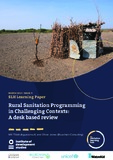Rural Sanitation Programming in Challenging Contexts: A Desk Based Review
| dc.contributor.author | Tillett, Will | |
| dc.contributor.author | Jones, Oliver | |
| dc.date.accessioned | 2021-03-11T15:09:22Z | |
| dc.date.available | 2021-03-11T15:09:22Z | |
| dc.date.issued | 2021-03-09 | |
| dc.identifier.citation | Tillett, W. and Jones, O. (2020) ‘Rural Sanitation Programming in Challenging Contexts: A desk based review’, SLH Learning Paper 11, The Sanitation Learning Hub, Brighton: IDS, DOI: https://doi.org/10.19088/SLH.2021.001 | en |
| dc.identifier.isbn | 978-1-78118-747-0 | |
| dc.identifier.uri | https://opendocs.ids.ac.uk/opendocs/handle/20.500.12413/16461 | |
| dc.description.abstract | This report summarises the findings of a desk review on ‘Rural Sanitation in Challenging Contexts’. It was researched and written by Will Tillett (Aguaconsult) and Oliver Jones (Bluechain Consulting), on behalf of the Sanitation Learning Hub (SLH), UNICEF and WaterAid. The study sought to identify the current approaches, experiences and existing guidance in the sector in reaching those at risk of being ‘left behind’ from rural sanitation initiatives. The research looked at five broad, interconnected themes of ‘challenges’, including: poverty and social marginalisation; tough physical environments; entrenched social norms; livelihoods and lifestyles; fragile contexts. Through a review of around 180 documented resources and key informant interviews with 44 sector experts, it documented examples of literature, guidance and experiences in efforts for overcoming these challenges, noting common trends, and importantly, key gaps. Numerous recommendations arose through the study, which SLH, UNICEF and WaterAid are discussing with wider sector actors as to how to take some forward. | en |
| dc.description.sponsorship | Sida | en |
| dc.language.iso | en | en |
| dc.publisher | The Sanitation Learning Hub, Institute of Development Studies | en |
| dc.relation.ispartofseries | SLH Learning Paper;11 | |
| dc.rights | Attribution: You must attribute the work in the manner specified by the author or licensor. Non-commercial: You may not use this work for commercial purposes No Derivative Works: You may not alter, transfer, or build on this work. Users are welcome to copy, distribute, display, translate or perform this work without written permission. For any reuse or distribution, you must make clear to others the licence terms of this work. If you use the work, we ask that you reference the SLH website and send a copy of the work or a link to its use online to the following address: Sanitation Learning Hub, Institute of Development Studies, University of Sussex, Brighton, BN1 9RE, UK (CLTS@ids.ac.uk). | en |
| dc.rights.uri | http://creativecommons.org/licenses/by-nc-nd/3.0/ | en |
| dc.subject | Water | en |
| dc.title | Rural Sanitation Programming in Challenging Contexts: A Desk Based Review | en |
| dc.type | Series paper (IDS) | en |
| dc.rights.holder | IDS | en |
| dc.identifier.doi | 10.19088/SLH.2021.001 | |
| dcterms.dateAccepted | 2021-03-10 | |
| rioxxterms.funder | Default funder | en |
| rioxxterms.identifier.project | The Sanitation Learning Hub | en |
| rioxxterms.version | VoR | en |
| rioxxterms.versionofrecord | 10.19088/SLH.2021.001 | en |
| rioxxterms.funder.project | 44cbea9c-3179-456c-bc3f-9b7cd4f89d0d | en |
Files in this item
This item appears in the following Collection(s)
Except where otherwise noted, this item's license is described as Attribution: You must attribute the work in
the manner specified by the author or licensor.
Non-commercial: You may not use this work for commercial
purposes No Derivative Works: You may not alter, transfer,
or build on this work.
Users are welcome to copy, distribute, display, translate
or perform this work without written permission. For any
reuse or distribution, you must make clear to others the
licence terms of this work. If you use the work, we ask
that you reference the SLH website and send a copy of
the work or a link to its use online to the following address:
Sanitation Learning Hub, Institute of Development Studies,
University of Sussex, Brighton, BN1 9RE, UK (CLTS@ids.ac.uk).


